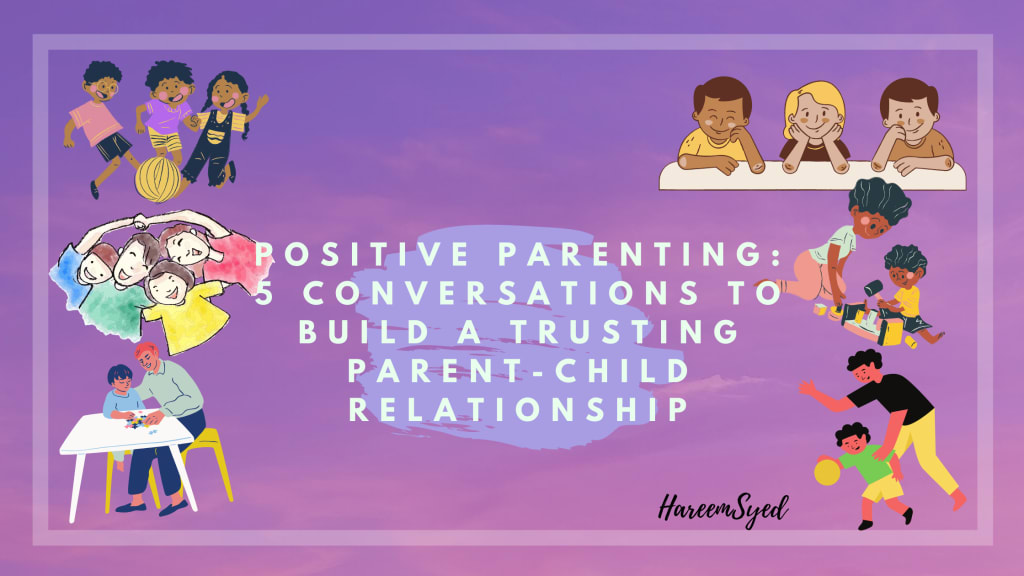Positive Parenting: 5 Conversations to Build a Trusting Parent-Child Relationship
There's more to a parent-child relationship than food, water and shelter.

Childhood is the most crucial phase of life. Kids in here usually can't dare to speak up about whatever is going inside their little heads. As a result, many thoughts stick to their minds, unwavering. A lot of children use coping techniques to suppress those thoughts, never to face them again. But these may appear instinctively as they grow old. Most parents deem providing the necessities of life to their kids will help them overcome those puzzled thoughts. But as they do so, they spend no quality time with them. Hence, a barrier develops with a lack of parent-child interaction, which prevents effective communication between them, which parents sometimes call 'complaining' as kids behave grumpy due to parents' inattention.
In reality, it is the lack of trust between them that causes children to act silly. Children truly like when their parents show interest in their lives. But many times, parents don't give much emphasis to it. Parents should remember that food, clothes, and shelter are sometimes just not enough. Children also need to have the mental stability to behave appropriately. This mental stability comes when children learn and grow in an affirmative environment. Even those matters that may seem trivial to parents, but children need their parents to hear those. Indeed, kids often feel shy to start talking themselves, especially when they do not have a solid parent-child relationship. But there are several topics on which parents can initiate a conversation themselves to check up on their kids and eventually build trust in them. Some of them include:
1. Ask them about their Friends
As soon as children get introduced to the outside world, they incline towards other children and try to be friends. Friends made at this phase can have a significant impact on their personality development. Therefore, parents should talk to their kids about their friends' choices, preferences, and habits. Talking to kids about their friends is one way to ensure kids that their parents are interested in their lives, saving them from many detrimental outcomes in the future. Parents may utilize tactics like inviting their friends for lunch or on a simple play date. When children see parents giving value to their friends, it will encourage them to talk more about them to their parents. This way, parents can easily converse with them about their peer circle and the ideas, opinions, and behavioral outcomes they hold.
2. Know about their Future Goals, Dreams, and Aspirations
Childhood is that period when children are open to an infinite number of possibilities. They idolize several people at the same time and aspire to achieve so many things together. Many children are confused about their future goals as they have a pool of opportunities in front of them. A lot of them get indecisive, unable to identify their true potential. Therefore, parents can rescue their kids by helping them identify their true aspirations and help them achieve those. Even we all have seen many people working in a field unwillingly, the cause of which many of them utter, the presence of no one in their childhood to help them decide their true ambition. Whether parents realize it or not but they know their kids better than all. And while some children don't need it, many of them often want their parents to talk to them about their dreams, goals, and aspirations and help them decide where they can excel in the future.
3. Interrogate about Physical, Psychological, and Emotional Stressors
Parents should converse about the physical stressors and interrogate any such incident that may have caused them a bodily disruption, such as their involvement in any fight. Likewise, as much as they should talk about physical stressors, emphasizing psychological and emotional well-being is also necessary. A widely held perception is that children cannot have any psychological or emotional disturbance since they are burden-free and enjoying most of their lives. The truth is children have their issues according to the developmental stage they are rolling in. Everyday psychological and emotional stressors among kids include bullying, inferiority complex, lower self-esteem, peer issues, etc. Thus, parents should know about how their children are feeling. What kind of thought process and content children hold can only be understood by communicating with them.
4. Converse about Current Issues
Conversing about current issues with your child is another great way of knowing what's happening inside their minds. Their perception, opinions, and beliefs regarding a particular issue tell a lot about them and even predict their overall personality. Consider this hypothetical example of John, a 12-year-old kid who is often unfriendly with her younger sister and only likes when she conforms to him. When the news showed how the American female employees are paid half of the men's wages, he shows expressions of delight. His narrative about the women is absurd in general too. He holds disgust about feminism and the #Metoo movement and proudly says that he shares funny memes on women's day. He believes in commanding others inferior to him, for instance, his sister and his dog. Thus, his opinions reveal the disturbing traits of authoritarian personality that parents can work on before it's too late.
5. Discuss their Health
Usually, kids are vulnerable to immoral and ridiculous activities such as drinking and smoking early. It mostly starts with a wrong peer circle which is mostly the consequence of neglectful parenting. Thus, parents should be interested in their kids' lives and habitually discuss their health and fitness. So that upon finding out the involvement in any corrupt activity, parents can educate them the potential harms of participation in such activities and teach them other constructive ways to deal with it. For example, teens often perceive that smoking is the only way to relax (because of nicotine), forsaking harsh outcomes of it. However, parents can play a significant role here and teach them other healthy ways of relaxing, such as exercise, going out, spending time with friends, etc. It can productively take place only when parents talk about this to their kids.
At last, parents must understand that children could not be treated well by having sufficient means of tangible goods only. Paying attention to what else they need is the key. Children crave devotion, love, and care as much as they need food to eat and a roof to live. A positive parent-child relationship where they are not just heard but understood will surely help build kids' trust. Read more about how to develop healthy relations with your kids and others at DIY: 7 Counseling Hacks to Develop Healthy Relations
About the Creator
Hareem Syed
An undergraduate student by job, a writer by passion, an optimist and an explorer by nature.
Follow me on Instagram: @hareemsyeddd






Comments
There are no comments for this story
Be the first to respond and start the conversation.